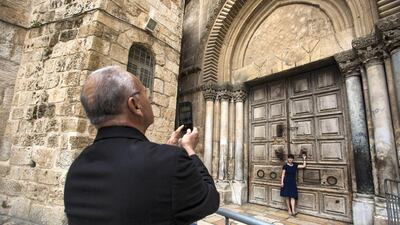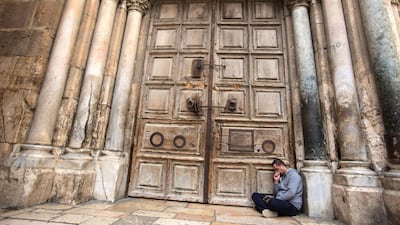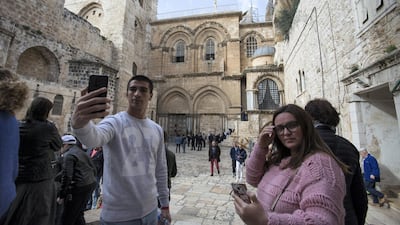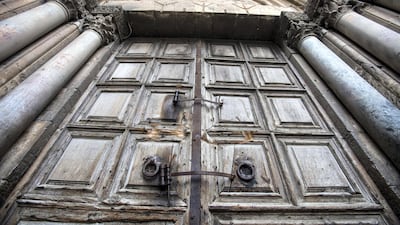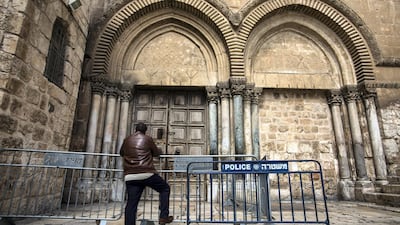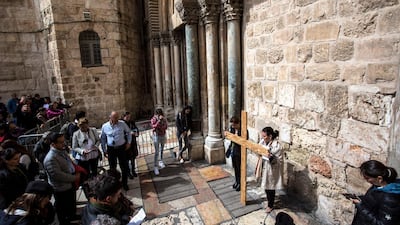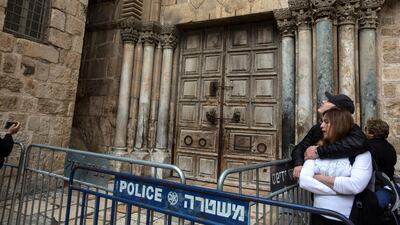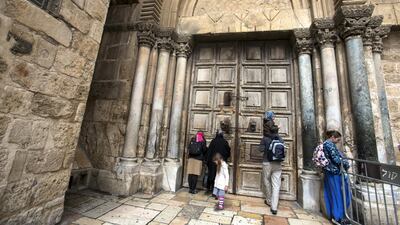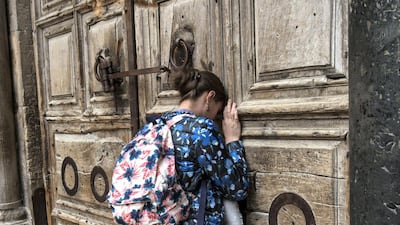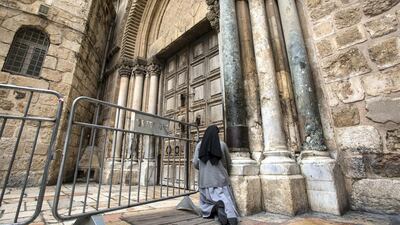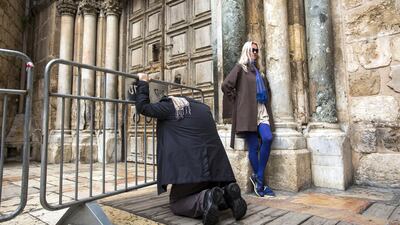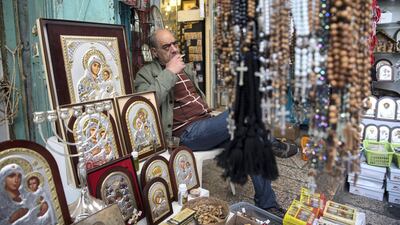Dozens of disappointed pilgrims gathered outside the Church of the Holy Sepulchre on Monday as it remained closed for the second day in a row.
Roman Catholic, Greek Orthodox and Armenian church leaders announced an indefinite closure of the church on Sunday to protest against a bill that would enable the Israeli state to expropriate land sold by churches as well as a new policy of the Jerusalem municipality to levy taxes on church-owned commercial properties in the city.
Churches fear the expropriation bill will make it harder for them to sell their property, the proceeds of which are vital to church activities. The new tax is also seen as a financial blow to the churches.
Sri Lankan caregiver Anusha Nimini came to the church – believed by Christians to be the site of Jesus's crucifixion and resurrection - as she does every week, to light candles.
"I had no idea it would be closed. When will it open?" she asked. She recited prayers against the backdrop of the huge, shuttered wooden doors, asking God to help her ailing mother.
"I know something is wrong here, but I prayed outside and I feel good," she said.
"This is a shame, I've come a long way and the church is part of the pilgrimage," said Adam Lowe, a university student from London.
"I'm Catholic and I wanted to pray," he added. "But I can understand the position the church is taking."
Nidal Aboud, 24, from Jerusalem's Old City sat slumped against the door of the church. He said he would wait there until it opens.
"I'm not happy," he said. "Israel is trying to have hegemony over the church. The church belongs to the believers, not Israel."
Jerusalem mayor Nir Barkat said that assessing the tax is a matter of equal enforcement of the law.
But the closure risks turning into a major public relations fiasco for Israel just two months after it secured US recognition of Jerusalem as its capital.
Traditionally it has tried to project an image of being benevolent to Christian communities in order to buttress its claim of sovereignty over all of Jerusalem.
_______________
Read more:
Jerusalem's Church of the Holy Sepulchre closed for second day
Christians close doors of famous Jerusalem church to protest taxes
______________
"Of course there should not be these taxes," said the Reverend Canon John L. Peterson, former secretary general of the worldwide Anglican Communion. "These churches provide real social services such as hospitals and schools, and these policies will harm their ability to do that. The status quo should be maintained."
Unless Israel relents, he said, Easter season will be "spoiled."
Israeli backers of the expropriation legislation say it is necessary to protect homeowners against the possibility that private companies will not extend their leases.
Father Jamal Khader, the Catholic parish priest of Ramallah in the West Bank, described the closure as "a call for the international community and churches to do something to protect holy places in East Jerusalem and preserve the Christian community and churches".
He said that Jordan, which according to peace agreements with Israel is the custodian of Muslim and Christian sites in Jerusalem, had urged Israel to drop the new tax measures.
Israel's neighbour condemned on Sunday the proposed property law and decision to impose taxes on church-owned facilities in Jerusalem.
Mohammed Momani, a government spokesman, said Jordan rejected Israel’s attempt to “alter the historical and legal status quo” in east Jerusalem’s holy sites – including Muslim and Christian properties and endowments.
Those measures violate international and humanitarian laws, he said, according to Jordan’s Petra News Agency.
Mr Momani said they “target the historical Christian presence in Jerusalem".
He urged the Israeli government to “immediately reverse the decision taken against churches”.
Mr Momani also said that Jordan will continue its efforts “to strengthen the steadfastness of the Palestinians and to protect holy sites as well as preserve the historical status of Jerusalem”.
Meanwhile, Christian leaders in Jordan said they too rejected the Israeli measures.
Bishop Yasser Ayyash, of the Greek Catholic Melkite Patriarchate in Jerusalem, said: "We reject those measures that are harmful to Jerusalem, to the Holy Land, hurt the pilgrimage and undermine the message of peace and love."
Boulos Haddad, pastor at St George Greek Melkite Catholic Church in the town of Fuheis, said that all the churches unanimously reject this “arbitrary” decision.
“The churches are Christian endowments and have never paid taxes before. They all stand united against this measure,” he said.
Church leaders in Fuheis, a predominantly Christian town, are planning a sit-in on Monday evening to protest the decision.
Last summer, Jordan was angered by Israel’s additional security measures installed at the Al Aqsa mosque compound, of which Jordan is custodian, before they were lifted.
“Israel as an occupying force doesn’t have a right to impose taxes on citizens,” said Nabil Ghishan, a member of parliament and himself a Christian.
“This is a serious and dangerous measure. Israel has been cracking down on Muslims before Christians. This is an international issue since the churches have followers all over the world,” he said.
